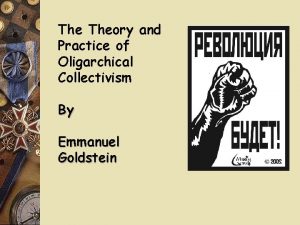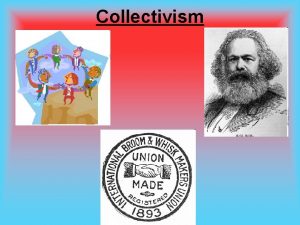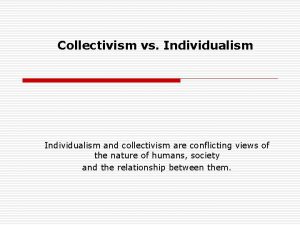Intro to Collectivism Collectivism emphasizes the importance of











- Slides: 11

Intro to Collectivism

• Collectivism emphasizes the importance of human interdependence in society – all people rely on each other in many ways and are connected • Collectivism lies at the heart of ideologies such as socialism, communism, and Marxism • Most modern liberal democracies are based on a blend of individualist and collectivist ideas. “Interdependence is and ought to be as much the ideal of man as selfsufficiency. Man is a social being. Without interrelation with society he cannot realize his oneness with the universe or suppress his egotism. His social interdependence enables him to test his faith and to prove himself on the touchstone of reality. ” – Mahatma Gandhi “. . . for many of our white brothers, as evidenced by their presence here today, have come to realize that their destiny is tied up with our destiny. And they have come to realize that their freedom is inextricably bound to our freedom. ” – Martin Luther King Jr.

• Democracy includes elements of political collectivism due to the importance of a social contract and the collective will (majority rule) • Co-operation – the means through which members of a group achieve common goals and make decisions; most group activities depend on our ability to co-operate with others. • Co-operatives – businesses or operations that are owned/managed collectively (ex: credit unions, Co-Op grocery stores) http: //www. youtube. com/watch? v=m. Ct. VL 9 E 2 OZI


• Economic equality is a common principle in all collectivist ideologies but can take many different forms: – Progressive Income Tax – people with larger incomes pay a higher tax rate – Equal pay for equal work (male vs. female) – Equal distribution of wealth in a nation – Guaranteed employment or minimum income – Abolition of private property – Collective ownership of means of production

• Public property – anything (land, buildings, etc. ) not owned by private individuals, instead it is owned by the state (government) • Marx thought that if workers collectively owned factories and businesses they would profit more from their own labour and be more motivated. • Critics say that economic collectivism decreases motivation because there is no individual incentive to work hard.

• Privatization – when gov’t sells public property to private individuals/business (Ex: Air Canada) • The privatization of certain natural resources (oil, water, etc. ) is controversial. • Nationalization – when the gov’t buys/takes over a privately owned business

• The Canadian gov’t owns public property in the form of schools, parks, Crown land Crown corporations. • Crown corporations are usually created to provide services that are too expensive or important for private businesses to provide, they are then managed in the interest of all of society. – Examples: Canada Post, building of the Canadian Pacific Railway, CBC

• Collective interest – the common interests shared by members of a group also the belief that individual interests are often better addressed by creating a set of common interests to pursue • The Assembly of First Nations is a group that represents all First Nations citizens in Canada on a national level, works to address issues for all First Nations people.

• Labour unions – pursue the collective interests of their members by negotiating with employers for better pay and working conditions • Collective responsibility – the group is responsible for the actions of members and individuals are responsible to the group as a whole – Example: a campaign such as M. A. D. D. relies on collective responsibility to be successful

• We also share a collective responsibility in society to look after each other and work together to improve our communities. • Society also influences us through adherence to collective norms – there are certain expectations for our behaviour that we all follow – Norms will vary between groups and societies. • Censorship – the deliberate restriction or limitation of information – A form of imposing a collective norm
 Oligarchical collectivism meaning
Oligarchical collectivism meaning Is collectivism communism
Is collectivism communism Public property collectivism
Public property collectivism Who are these
Who are these The theory and practice of oligarchical collectivism
The theory and practice of oligarchical collectivism Collectivist society definition
Collectivist society definition Individualistic culture vs. collectivist culture
Individualistic culture vs. collectivist culture Collectivism government
Collectivism government Principles of individualism
Principles of individualism Oligarchical collectivism
Oligarchical collectivism The watchman style of policing emphasizes
The watchman style of policing emphasizes Just intime
Just intime




















